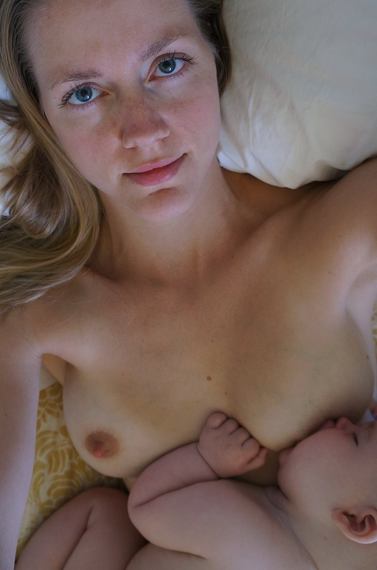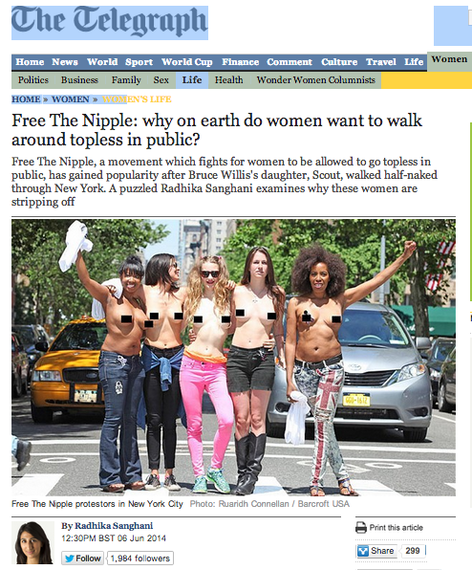Note: Some images in this post contain nudity.
Two weeks ago, if a photograph of an actively breastfeeding mother with nipples exposed was shared in Facebook, that photograph would have violated the company's guidelines regarding nudity and obscenity and been removed. According to my conversations with Facebook spokespeople, as the result of a quiet policy change made two weeks ago, that is no longer the case. The female nipple ban no longer exists for breastfeeding mothers, which should make many people who have been pushing the company to address a nudity double standard at least partially happy.
Last year, when Jaclyn Friedman, Laura Bates and I organized a social media campaign challenging Facebook to recognize gender-based hate, the public focus of the initiative was on revealing the ways in which content depicting gross violations of women's human rights -- rapes, domestic battering, widespread violence against women -- were being treated as, among other things, harmless jokes. After five days, 60,000 tweets and 15 advertisers leaving the platform, Facebook acknowledged the problem and committed to addressing it. We've developed a productive working relationship and continued to work on policies related to free speech and violence against women on their platform.

Photo credit: Paala Secor, 2014
Of equal importance to gender-based hate was the issue of the context in which content passes moderation. As a reflection of the world's culture, Facebook continues to be a place in which depictions of women as sexually objectified (overt pornography violates community standards) or debased is broadly allowable, but others, in which women represent their own bodies for non male-gaze sexual pleasure, is largely not. So, for example, at the time of our campaign post-mastectomy photographs with exposed, unaffected breasts were removed for violating nudity policies. Similarly, photographs of woman breastfeeding with fully-exposed breasts, or toplessness in art or political protest were, as the latter two still are, banned on the site.
For the past year we have been actively involved in pressuring the company, as have many others, to remove restrictions on women's freedom of speech that results from "obscenity" double standards.
Among the clearest examples of how distorted ideas about "obscenity" are is the treatment of breastfeeding mothers, off-line and on. While female toplessness is legal in many places, and breastfeeding in public is legal everywhere in the US, it remains "obscene" under many social media rules, and in daily interactions offline. There are entire Facebook pages, such as FB v Breastfeeding and Hey Facebook! Breastfeeding is Not Obscene, dedicated to the issue. Breastfeeding selfies, a trend, could not be shared on the platform. Each time there is news about graphic and violent content allowed in Facebook, the ridiculousness of banning photos of women feeding their children is highlighted.
Similarly, it seems as though not a week goes by that Instagram, which is owned by Facebook, isn't embroiled in a controversy regarding female nudity, usually toplessness.
Two weeks ago, Instagram disabled Rihanna's Instagram account and then quickly reinstated it. She has since mocked their nudity policy and closed the account. Rihanna's body-based statement was hardly new, but is more and more common. Last week, Scout Willis took topless walk through New York to protest Instagram's polices after she posted a photo of a t-shirt featuring two topless friends. Instagram called Willis' deleted photos (which included nipples) "incidences of abuse." Last week, model Natalia Vodianova posted a "legal" breastfeeding photograph (no nipples showing) that was criticized by breastfeeding advocates who felt that the image did more harm than good by sexualizing the act. These high-profile celebrity engagements, led earlier this year by Miley Cyrus, are helping the #FreeTheNipple movement pick up serious steam. Even the cartoon icon for #FreeTheNipple, a global movement that has grown up around a soon-to-be eponymously named movie about decriminalizing the female body, has been removed from Facebook, while the Hooter's "owl" and Travelocity's remains cozily entrenched.
A lot of ire is focused on Facebook, because, in terms of population, it is the third largest country in the world. Facebook is not responsible for the double standards, or the rules and beliefs that they reflect. They are mainstream ones in these regards. The MPAA, the FCC and the modesty and morality police of the public sphere are all equally censorious about women's toplessness. However, by virtue of its regulation of content, it is an important social arbiter of them.
The very traditional and mainstream ideas about nudity that Facebook and other social media companies are grappling with maintain the cultural idea that women's bodies are first and foremost, sexual objects and second, can be regulated in terms of distribution.
Laura Dodsworth, a photographer, launched the project Bare Reality, to explore the dichotomy between how women feel about their breasts privately and how they are presented for public consumption through the media.
"I know how frustrating it can be to push these restrictions on social media platforms, as they can be more conservative and discriminatory than real-life society," she says. "For instance, it's ironic trying to create a conversation about Bare Reality on Facebook, because I will never be able to share the artwork there -- for personal and political reasons I will not obscure women's nipples. Controlling female nudity is about controlling women.
The idea that women should be able to share non-sexually objectifying images of their bodies, a form of counter-speech to our pervasive sexual objectification, eludes many people, who seem to skim the surface of what the core issues are.
The point is not that all women should walk around topless. Nor is it a display of sexuality or "me, too" activism. The point is that culture promotes denigrating, sexually objectifying images of women and girls, everywhere we look, while simultaneously barring us from freely using our bodies to renounce the same. This is a symptom of patriarchal power. In social media and on newsstands today you can see the cover of, for example, Sports Illustrated 50 Anniversary issue featuring three women, buttocks thonged, bared and oiled, in Facebook, but cannot share news featuring pictures of women, bared breasts, protesting laws, creating art or objecting to policies barring toplessness. These are possible, future infringements on the silencing-intent speech of bullies, but actual and ongoing suppressions of women's speech.
These mainstream rules are rooted in ideas about who has access to whose women's bodies. Consider "the nipple problem" in light of virtually ever culture's ideas about "ladies." The word "reserved" is frequently used to describe women who are laudably ladylike. In general, a woman who bares her breast is not considered a lady at all, but, frequently the exact opposite. She becomes a public women, in the historical sense, "bad." The idea that "public" women are available to all men for sex, and also deserving of degradation or any violence that comes their way, retains a strong hold on societies the world over.
Most people think of "reserved" as it pertains to women as meaning "modest," but that's not all it means. In the subtle and implicit sense of wordplay and the human psyche, a reserved woman is also one "held for private use." Whose? The woman's? That is highly doubtful since she is actually in possession of her breasts at all times -- she is just not in control of their use and representation. So then it becomes a matter of other people uses, representation and access. While the relaxation of the rule regarding breastfeeding mothers is a good one, it is still problematic in that in the case of women's breasts they are allowed to be seen in someone else's use. This is an association of women's bodies with service and sacrifice. With mastectomies the association is with pain and suffering. In neither case is the woman's painless, selfish, autonomous expression primary.
Needless to say women in possession of themselves make some people uncomfortable.
It's important to note that Facebook only removes content when it has been reported by members of the Facebook community. In other words, when a woman posts a picture of herself, it is only removed after someone on Facebook complains that it is "offensive."
"We regularly review our Community Standards to ensure they're balancing the varying interests of the people who use Facebook. Our Community Standards are designed to promote expression while ensuring Facebook is a safe and respectful environment for everyone," explains spokesperson Matt Steinfeld. "These interests are particularly diverse when it comes to nudity, which is why we gather feedback from people and organizations who use Facebook."
Facebook's policy statement remains brief and, undoubtedly for legal reasons, open to interpretation. Steinfeld was clear, however, that people will be able to share breastfeeding photos, where women are actively breastfeeding, even if the mother's breasts are fully exposed. There may be other things going on in a photograph that violate community standards and result in removal, but it won't be the pornification of nursing women. So much effort, by so many people, over so many years, for this one small thing.
It still remains true, however, that sexually objectifying content and non-consensual photography, are proliferated in massive quantities daily and allowable, while pictures of women politically protesting topless or displaying nudity in art are not. Facebook deserves credit, however, for making two important changes in the past year. They changed their policy toward mastectomy photographs and made it possible for millions of women who have survived breast cancer to, if they so chose, post their photographs. And a mother breastfeeding her child, and sharing a photograph of it, is no longer considered obscene. These two changes, a long time in the making, mark a move in the right direction.
